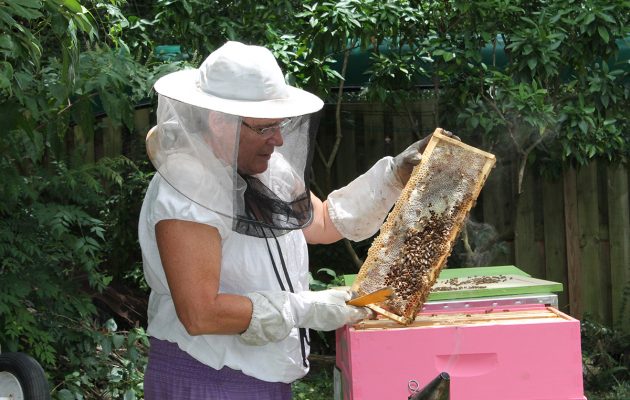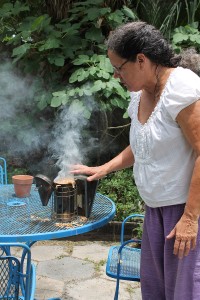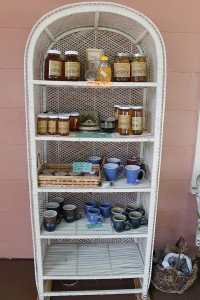Backyard beekeeper keeps neighborhood healthy

In the backyard of Ruth Murrey Thompson’s house on Osceola Street, a six-foot privacy fence separates six colorful bee hives from her Riverside neighbors. They often spy her dressed in a white long-sleeved jacket, gloves and a veiled hat over her head, as Thompson, an advocate of urban beekeeping, cares for her honey bees or extracts honey from the bright pink and green hives.
 “If bees are going to survive they will need the care of urban beekeepers,” said Thompson, who has been keeping bees for three years. “I read once, ‘What’s better? One commercial beekeeper with 6,000 hives or 6,000 beekeepers with one hive?’”
“If bees are going to survive they will need the care of urban beekeepers,” said Thompson, who has been keeping bees for three years. “I read once, ‘What’s better? One commercial beekeeper with 6,000 hives or 6,000 beekeepers with one hive?’”
Thompson is one of an increasing number of urban beekeepers all over the country who provide a service for the city and a home for bees who pollinate the trees and flowers of the community, and then shares the honey with their neighbors.
“I am happy to be able to contribute through beekeeping to the health of the neighborhood, not only through honey but also through the pollination that the bees provide and also the awareness that beekeeping provides to the community,” Thompson said.
She maintains three producing hives and three starter – or nuclear – hives, but her Riverside neighbors don’t have to be afraid of encountering many bees from her hives. The privacy fence helps control the flight of the bees when they seek new pollen sources because the height forces them up and out – above the heads of most people – rather than straight out at a lower altitude.
On her bucket list
Ever since college, when Thompson would hitchhike from Miami to Ft. Lauderdale to work at a bee farm, she’s had a fascination with beekeeping.
 “Beekeeping was always on my bucket list,” said Thompson, who decided to follow her passion three years ago and learned how to become an urban beekeeper through the Jacksonville Beekeepers Association at the Duval County Extension Office on McDuff Avenue.
“Beekeeping was always on my bucket list,” said Thompson, who decided to follow her passion three years ago and learned how to become an urban beekeeper through the Jacksonville Beekeepers Association at the Duval County Extension Office on McDuff Avenue.
Thompson started beekeeping in her backyard, next door to the house she grew up in and where one of her three siblings now lives. Her grandparents, Matthew and Mae Murrey, bought the side-by-side houses in 1921, around the time her father Matthew was born. Her mother, Margaret Sares Murrey, passed away in that house a year before Thompson gave in to her desire to raise bees.
A graduate of St. Paul’s Catholic School, as was her father and her son, Thompson attended Bishop Kenny High School and some college, then traveled a bit before moving to the Bahamas, where she had three children and owned a florist shop for 20 years.
After moving back to Jacksonville, Thompson trained to be a medical records coder and works part-time in that field, but her passion is for the bees.
Sweet attachment
Thompson is attached to her bees and is sometimes reluctant to split the hives to start a new one in another location, but knows she must for the good of the hive.
“I love beekeeping, I love being able to supply raw honey to neighbors and I love taking care of the bees,” said Thompson. “Sometimes I begin my morning with a cup of coffee sitting by the hives watching the bees. I usually check the hives once a week, on a weekday so they don’t bother the neighbors, and through this process get a look at the health and needs of the hive.”
Thompson’s hives yield 15 gallons of honey a couple of times a year. She will use a quart a month personally, and sells her Grateful Apiaries honey products – which include salves, lotions and lip balms – on the honor system from her front porch.
Since she is restricted to just a few hives in her backyard, Thompson keeps more apiaries in Fort Caroline, where her cousin George Sares has an orange grove. Sares also makes garden hives out of cypress that Thompson sells to prospective beekeepers and then helps manage their hives.







